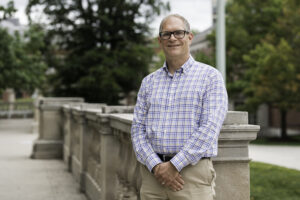Give me 5
Give me 5
Five minutes with David Figlio, Provost and Gordon Fyfe Professor of Economics and Education

As provost and chief academic officer, what do you see as the University’s top opportunities and challenges?
A university’s role is to enable boundless possibilities for people within its community. That’s why our goal from an academic perspective must be to make sure our students, faculty, and staff find that this is a place not only to study and work but to truly thrive.
The University’s new strategic plan—which we will communicate more about early next year—aligns with this thinking. In it, we will outline how we will create conditions for people to achieve their highest aspirations. Central to this is figuring out the infrastructure needed to do that and looking at what’s getting in our way.
What can you share with us now about the strategic plan?
We will focus on the University’s deep, broad, and wide excellence as a scholarly and creative hub. First, we must make sure that the areas where we have established distinctions, as well as emerging ones, are as strong as possible. We also need to identify new areas where we can be particularly consequential.
Second, we must continue to create, preserve, and disseminate knowledge and develop robust educational programs. This means considering what could be possible if we had no constraints. We need to be the model for the 21st century for the residential research university so that our graduates can continue to flourish and lead.
A third area involves our relationship with the City of Rochester and our region. We benefit from a vibrant, healthy, and successful Rochester, and as the region’s largest employer and with our myriad partnerships, we play a large role in contributing to Rochester’s success. Our strategic plan embraces this relationship.
What is the University doing to recruit a diverse faculty?
Smart institutions are addressing this, for instance, through cluster hires, which involve hiring multiple faculty members who have complementary academic interests at the same time. They can help recruit one another, become a cohort, and can take away some of the pressure felt by a lone underrepresented person in a unit. We need to do more of this.
We also must address what universities often do, which is trying to diversify faculty by hiring those who have been traditionally underrepresented at the entry level. Suppose that most of an institution’s faculty from historically marginalized communities are all junior people? What kind of dynamic and culture does that create and sustain? Junior faculty have less influence than those with more years in the profession. I endorse not only cluster hiring, but also making sure we hire underrepresented faculty at all career stages and across all fields.
As an education and health policy expert, what has your research revealed that readers might find surprising?
I started studying the relationship between early health and educational outcomes about a decade ago. I tracked over one million kids from birth through elementary and secondary school and found that the higher their birthweight, no matter what the birthweight, the better their later educational outcomes. Birthweight can also be an indicator of maternal health during pregnancy, and it can be a proxy for other aspects of fetal development.
For instance, I looked at gestational exposure to environmental toxicants. It turns out that low birthweight affects not only overall health but also cognitive development. This is because the blood-brain barrier is most porous during gestation. So, if you are exposed to toxic waste in your environment in utero, those toxins will go straight to your brain. One lesson from this is that we can’t think about our health and cognition as being separate. We need to think about human wellness holistically. At Rochester, we have people looking at human flourishing from so many different dimensions. This is something that drew me here.
What are your favorite kinds of books to read?
I love reading fiction featuring people who feel caught between worlds. Among my favorites in this genre is Americanah by Chimamanda Ngozi Adichie, a novel about a Nigerian woman attending a PhD program in the U.S. who is always walking a tightrope of sorts, trying to find her place within every potential community with which she might affiliate. Another novel I read more recently that touched on very different themes but that affected me in similar ways is Crossroads by Jonathan Franzen. I couldn’t put either book down.
These books are relatable: We are all trying to figure out who are we, what we stand for, who our people are. They confront the messiness that is part of our human condition. They remind me of the importance of the humanities, too—we all live in societies, work in organizations, exist in families, and we spend so much of our time engaging with other people. Much misunderstanding happens when we fail to consider a situation from another person’s perspective. I find that there is no better way to explore this, and to put myself in someone else’s shoes than to read narratives.
David Figlio began his role at the University July 1, 2022. He is an internationally recognized economist and educational leader whose interdisciplinary research spans educational, public, and social policy.
This story originally appeared in the fall 2022 issue of the Buzz.
— Kristine Kappel Thompson, November 2022


